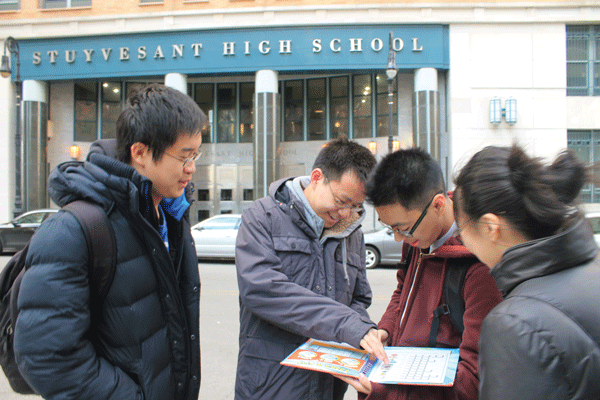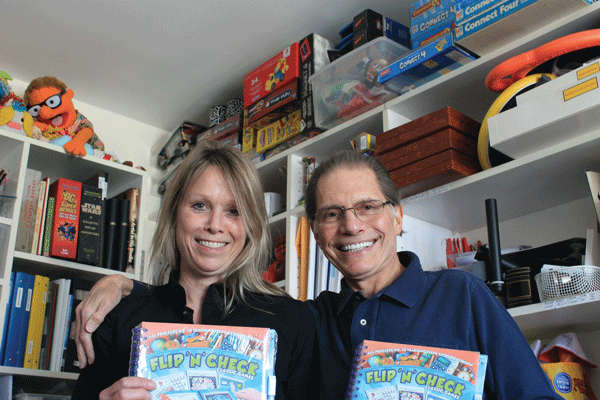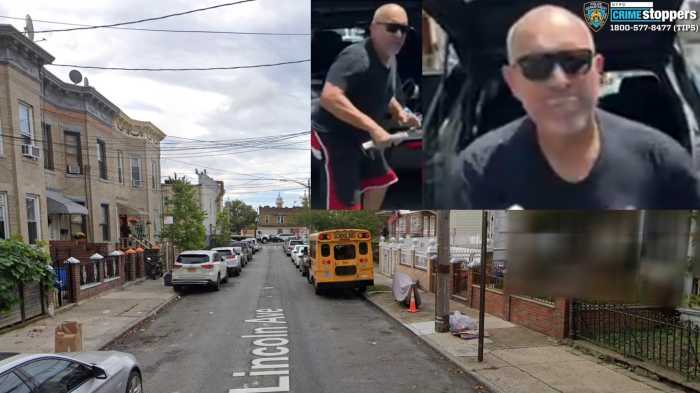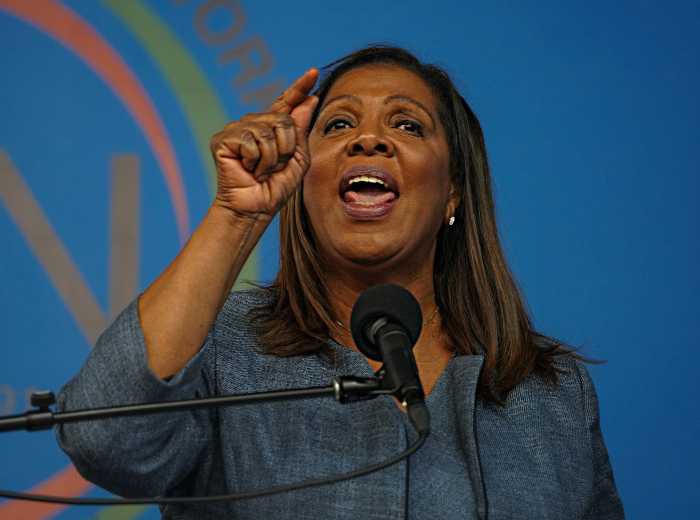
Kevin Wong, left, William Yen, Kevin Ni, and LeSi Qu, part of the core group of Stuyvesant High School students who are marketing Flip ‘N’ Check puzzles with the help of Pam Chmiel and Dr. Howard Wexler, inventor of Connect Four, below. Wexler
r invented the game 30 years ago, but it did not sell until he started working with the Teen Entrepreneur Boot Camp a few years ago. At bottom, a focus test of the game at Taste of Tribeca, 2012.
BY ZACH WILLIAMS | Students at Stuyvesant High School are heavily invested in the design, manufacture and marketing of an innovative puzzle collection called Flip ‘N’ Check which is now stocked by Downtown merchants and others along the Eastern Seaboard.
The students are not alone though in the enterprise which started three years ago with a collaboration among students, Pam Chmiel, the co-founder of the non-profit Teen Entrepreneur Boot Camp, and Dr. Howard Wexler, a toy industry leader best known for inventing the popular board game Connect Four.
Their products make puzzles such as crosswords and mazes reusable by using a dry erase pen on transparent sheets which allow answer checking after flipping the game page. A direct involvement in readying it for commercial distribution is what has attracted about 70 students to volunteer for the start-up.
“After hearing about this I really wanted to get involved,” said LeSi Qu, a junior at the elite public high school in Battery Park City. “It seemed like a good way to explore aspects of the real world.”
While the original inspiration for the product emerged 30 years ago, its inventor says it would have never have come so far without the students.
“I gave them my invention and the kids developed it under our guidance,” said Wexler, a Lower East Side resident who also invented more than 120 consumer products.
Since then, local professionals and school children alike have also made contributions of their own to the company which seeks to instill among the Stuyvesant High teens a business sense beyond making a quick buck.
“The whole purpose of this program is to teach how a business operates,” said Chmiel, a Lower Manhattan resident who owned the former Klatch coffee bar in FiDi.

Several dozen students take part through a course at the school while a core group of about ten participants also toil after school and during vacations. All proceeds are reinvested in the business which operates officially as a 501(c) non-profit, Chmiel said. The students meet with potential clients, brainstorm design improvements and run a growing online presence.
“My brother wants to start his own business and wants me to help him so I thought through this program I could,” said Qu.
Through a process of feedback and refinement, students helped further develop the toy into its current format, including an expansion into additional versions and an initial manufacture of 2,000 copies at a factory in Guangdong, China. The puzzle sells for $7 per unit at wholesale prices, $14 retail.

The students have rubbed elbows with Goldman Sachs financiers, Walmart executives, and industry insiders at the recent International Toy Fair held at the Javits Convention Center in February. A Financial District law firm, Cadwalader, Wickersham and Taft, worked pro bono to help the teens secure a trademark.
Chmiel said she has learned along with the students how to make the product a reality through an understanding of international shipping and manufacturing processes.
“What I’ve learned is so important that I want them to go through this whole process,” she said.
Wexler — who at 76 years-old remains active in the enterprise — has assumed a senior advisory role to the students’ company, counseling both Chmiel and them as distribution expands. He expressed concerns though that the business may be too dependent on Chmiel, potentially undermining the role of the students.
She said she works long hours on the projects in hopes that future profits will eventually allow students to further consolidate their involvement outside the classroom where a core group primarily contribute. If successful, the program could expand to additional schools, she added.
“It is a very challenging program to keep it hands on,” she said.
Local book and toy shops have been among the first to stock Flip ‘N’ Check. A December event at Tribeca’s Barnes & Noble bookstore on Warren allowed the students to showcase the product to local families. Other area shops such as Boomerang Toys and HomsBoms Toys now carry it, among about two dozen stores overall according to Chmiel.
Feedback from such merchants has led to the creation of point of sale displays and a snappier name for what was originally called Correct Me If I’m Wrong.
Local school children meanwhile have participated in focus groups offering their own unique perspective.
It‘s an age group which the teen entrepreneurs often have little interaction with as long commutes, academics and college applications dominate their current lives.
“They’re really curious and like to be hands-on,” Qu said of the children who participated in one focus group.
Furthering childhood intellectual development through toys was a revolutionary idea, Wexler said, when he began inventing. His degree as a child psychologist, prominently displayed on some 1960’s products, played a key role he said in selling parents as well as corporate America on the notion that young children should be mentally stimulated in more active ways through consumer products than previously done.
He added that his creativity stems from dyslexia which went un-diagnosed until graduate school. Learning how to compensate for the ailment continues to inspire him as much as it did during a rough and tumble youth, which required him to run the family photo business as a teenager following the death of his father.
Chmiel said bringing the benefits of such personal business experience to the students is a big part of the program.
“Any entrepreneurship program is wonderful to teach kids in high school but if [the students] just follow these steps with me and follow it through A to Z, and they see it then they can go off ten years from now,” she said. “It’s like riding a bike.”





























